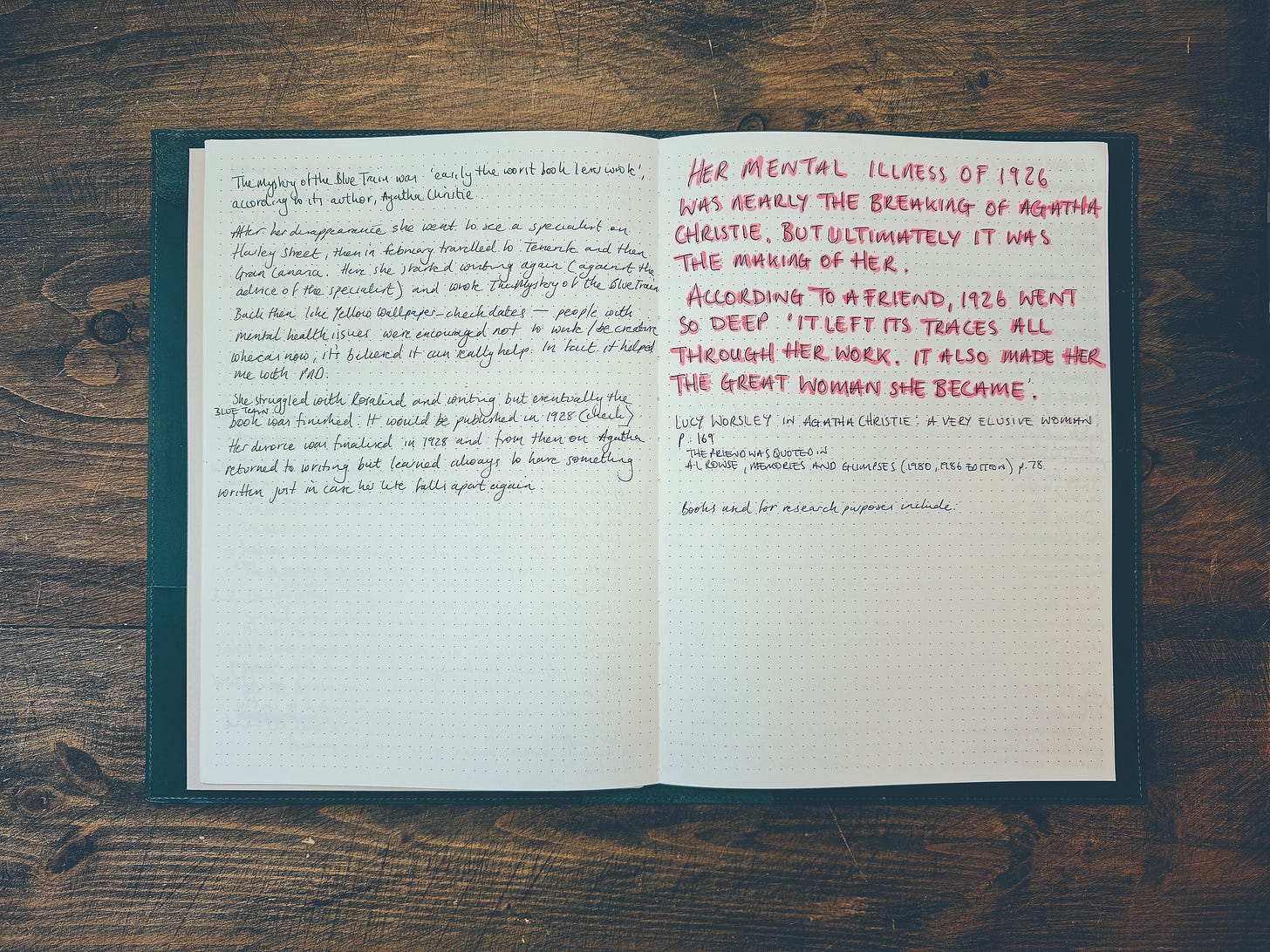Behind-the-Scenes of an Agatha Christie Essay
How did it feel to be writing something out of my comfort zone? What was the initial spark and what did my research and writing process look like?
Just an fyi. This piece is far too long for email, so it will be truncated. If you want to read it in its entirety, click anywhere in the body of the email, and it should open it up in your internet browser or the Substack app if you have that installed.
This behind-the-scenes piece is all about my writing process for my recent essay:
THE STORY BEHIND THE BOOK: Agatha Christie and The Mystery of the Blue Train
“Her mental illness of 1926 was nearly the breaking of Agatha Christie. But ultimately it was the making of her.
When I changed the name of this newsletter on Substack, one of the mini-projects I wanted to work on was a big, meaty essay—maybe written once a month—that involved research—lots of research—and wasn’t simply about my writing life but about an intriguing aspect of another writer’s life.
It made sense to start with Agatha Christie, as I already had my chronological reading project on the go.
Because it was a new-to-me project, it scared me. I would be taking a couple of steps out of my comfort zone, and, truth be told, I felt a little intimidated. But that’s exactly what I mean by the name ‘Brave Words’, as the title of this newsletter—taking on writing projects that scare you a little.
Naturally, before I’d even started, I was collecting the self-doubts in my head:
You’re not an expert on Agatha Christie.
You won’t be able to form a cohesive essay with a cohesive argument or story.
This is way out of your brain power abilities.
You’ll end up overwhelmed by all the research you have to do.
You’ve not read all of her books yet; what makes you an authority?
Why would anyone be interested in what you have to say?
So, with all that going on in my head, it did take me a while to start.
It’s a classic example of where I completely overthink what I need to do and utterly underestimate my ability to do the work required. This happens to me every single time I want to start a new project.
Several days later, once I’ve finally started, I realise I’m not stupid, as I’ve been telling myself, and that I do have the ability to see the project through. I refer to this Substack Note I wrote nearly two months ago:
What was the spark behind this essay?
As I mentioned in the essay itself, the idea for the essay came about after I read Agatha Christie’s ninth novel, The Mystery of the Blue Train. I also bought myself a copy of Poirot: The Greatest Detective in the World by Mark Aldridge to gain a little more insight into each book and the timeline.
It’s a little thing, but the timeline of Poirot was really bugging me. Why was Poirot retired at the beginning of The Murder of Roger Ackroyd (the seventh novel), growing marrows? Yet, at the end of The Big Four (the eighth novel), he stated:
“Yes, mon ami, together we have faced and routed the Big Four; and now you will return to your charming wife, and I—I shall retire. The great case of my life is over. Anything else will seem tame after this. No, I shall retire. Possibly I shall grow vegetable marrows!”
How can he be retired in the past and then plan to retire in the future? I get annoyed when books confuse me with timings, so I was hoping that a little research would help. Little did I know that this small annoyance would inspire me to write an essay that was just short of three thousand words. (And yes, I discovered the answer to the puzzling retirement question!)







